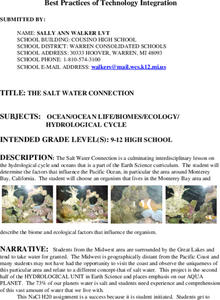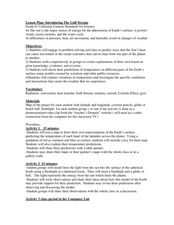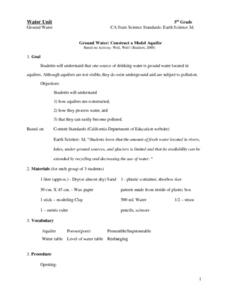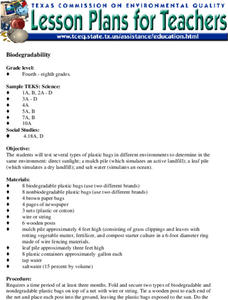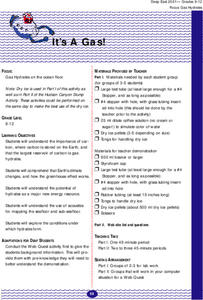Curated OER
The Salt Water Connection
Students explore the hydrological cycle and oceans. They determine the factors that influence the Pacific Ocean. Students research an organism found in Monterey Bay. They describe the organism's biome and ecological factors that...
Curated OER
Nothing New? A Physical Change
Fifth graders discuss the differences between chemical and physical changes. In groups, they complete experiments and discover how a physical chnage can be reversed. To end the lesson, they review the steps of the water cycle and...
Curated OER
Watercycle
Third graders examine the natural circulation of water from oceans, lakes, and rivers to evaporation into the air, and then to condensation to produce rain falling back to the soil as components of the water cycle.
Curated OER
Rising Air
Students investigate the concept of rising air in the formation of clouds and precipitation. In this rising air lesson, students conduct an experiment with hot and cold water that shows how warm water rises due to thermal buoyancy. They...
Curated OER
Introducing The Gulf Stream
Sixth graders research the average temperatures of different places on Earth. In this earth science lesson, 6th graders explain how the sun's heat cause ocean movement. They discuss how temperature change affects the weather we experience.
Curated OER
Air: Demonstrating Its Presence and Effects
Young scholars explore the concept of air. In this gravity lesson, students perform various experiments that deal with gravity, air resistance, and air pressure.
Curated OER
Edible Rock Layers
Students use edible food items to conduct an experiment that simulates the movement, folding, and faulting of rock strata like sandstone, siltstone, limestone, and shale. Students then get to eat the experiment when completed.
Curated OER
Ground Water: Construct a Model Aquifer
Students recognize that one source of drinking water is ground water located in aquifers. They create a model of an aquifer and summarize their experience in a report.
Curated OER
Do Salt Water Fish Drink?
Students conduct an experiment with potato cores and a sucrose solution to investigate how salt water fish process water. They develop a lab report of their experiment.
Curated OER
Locating Vent Fields Using CTD Data
Students describe the way hydrothermal vents work. Students work on locating vent regions through remote collection of data about water temperature and density. Comparing density and temperatures graphs, students search for indicators...
Curated OER
The Tides
Students experience a computer based applet that explains why the Earth experiences tides.
Curated OER
Saltwater Science
Students conduct an experiment that shows them how salt water allows things to float. In this salt water lesson plan, students mix ingredients together to create salt water and observe how it makes the oceans dense. They then interpret...
Curated OER
Three Methods of Heat Transfer
Students participate in a variety of experiments designed to illustrate types of heat transfer including conduction, convection and radiation. They complete worksheets as an assessment of the experiments.
Curated OER
HOW FAST DO SEDIMENT GRAINS OF DIFFERENT SIZES SETTLE?
Students conduct an experiment using sand, a jar, and a paper clip to analyze the effects of different kinds of sand vis a vis its sediment. They graph their findings and analyze for factors of size, shape, and density.
Curated OER
Hypothermia on the High Seas
Students identify and present the effects on humans when the body temperature falls, demonstrate and explain how the body loses heat, and understand hypothermia and cold water survival techniques.
Curated OER
Air Pressure and Wind
Fifth graders study air pressure and learn how it can change the weather. In this air pressure lesson, 5th graders study the given diagrams and complete the experiments to learn how air pressure can change the weather. Students read...
Curated OER
On the Rise . . . Sea Level and Global Warming
Ninth graders conduct an experiment to determine how melting sea ice affect sea level. In this earth science lesson, 9th graders explain the environmental consequences of rising sea level. They relate this lesson to global warming.
Curated OER
Biodegradability
Pupils test a variety of plastic bags to test its biodegradability. They record their observations and discuss them once the experiment is complete. They identify materials best suited to be placed in a landfill.
Curated OER
Landforms By Hand: Geography, Map Skills
Students experiment with landform vocabulary by using their own hands and a bar of soap as media.
Curated OER
Watercolor Rainbow Fish
Students experience an art project as a follow up to reading The Rainbow Fish.
Curated OER
It's a Gas!
Students explore the conditions under which hydrates form. They use the Internet to access information and conduct experiments to examine how the greenhouse effect works.
Curated OER
Barnegat Bay Watershed
Students design a model watershed. In this watershed lesson plan, students learn the needed parts of a watershed and how they work. Students evaluate how watersheds effect communities.
Curated OER
The Magic School Bus Goes to Mussel Beach
Students participate in a hands-on activity where they explore tidal zones. They explore tides and marine life. This is an experiment that can be accomplished in class.
Curated OER
Current Interactions
High schoolers design an experiment to see how wind, temperature, and salinity work together to influence ocean currents and present it in a report format. They explain to their classmates how experiment findings relate to ocean currents.


